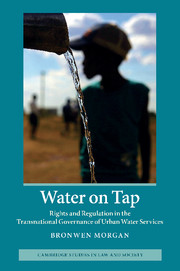Book contents
- Frontmatter
- Contents
- List of figures
- List of tables
- Acknowledgements
- Introduction: The field of global water policy: struggles over redistribution and recognition
- 1 Rights, regulation and disputing: a conflict-centred approach to transnational governance
- 2 Managed liberalisation and the dual face of French water services provision
- 3 ‘Another world is possible’: Bolivia and the emergence of a participatory public provision model for access to urban water services
- 4 Regulatory arbitrage and popcorn politics: contrasting disputing pathways in Argentina and Chile
- 5 Moonlight plumbers in comparative perspective: electoral v. constitutional politics of access to water in South Africa and New Zealand
- 6 Law's work: legality and identity in transnational spaces
- Epilogue
- References
- Index
- CAMBRIDGE STUDIES IN LAW AND SOCIETY
1 - Rights, regulation and disputing: a conflict-centred approach to transnational governance
Published online by Cambridge University Press: 03 May 2011
- Frontmatter
- Contents
- List of figures
- List of tables
- Acknowledgements
- Introduction: The field of global water policy: struggles over redistribution and recognition
- 1 Rights, regulation and disputing: a conflict-centred approach to transnational governance
- 2 Managed liberalisation and the dual face of French water services provision
- 3 ‘Another world is possible’: Bolivia and the emergence of a participatory public provision model for access to urban water services
- 4 Regulatory arbitrage and popcorn politics: contrasting disputing pathways in Argentina and Chile
- 5 Moonlight plumbers in comparative perspective: electoral v. constitutional politics of access to water in South Africa and New Zealand
- 6 Law's work: legality and identity in transnational spaces
- Epilogue
- References
- Index
- CAMBRIDGE STUDIES IN LAW AND SOCIETY
Summary
Introduction
This chapter aims to elaborate an analytical framework that can integrate the dynamics of social protest into understandings of the transnational governance of a particular kind of social policy problem. These are issues of social policy provision that involve significant capital investment but also directly impact the basic needs of individuals, of which access to water is an example. Transnational governance is now the subject of an extensive literature, ranging through anthropology, law, sociology and politics. The different strands of literature have two observations in common: first, that forms of transnational governance, including substantive social policy initiatives in a transnational context, increasingly focus on rules and standards rather than, or in addition to, legally mandated redistributive settlements. Second, transnational governance is shaped as much by non-state actors as by national state interests.
This second commonality in the literature obscures an important double decentring – that of national states and national laws. Literature from politics and the world systems approach in sociology tends to focus on the decentring of states, expressed in a burgeoning interest in regulation, networks and norm transmission. Anthropological and more micro- sociological literature by contrast is more concerned with the decentring of law by extending long traditions of enquiry into legal pluralism into the transnational sphere. This double decentring is particularly challenging for (formal) law, given law's layered relationship with the state – both part of the state and independent from it.
- Type
- Chapter
- Information
- Water on TapRights and Regulation in the Transnational Governance of Urban Water Services, pp. 22 - 48Publisher: Cambridge University PressPrint publication year: 2011

